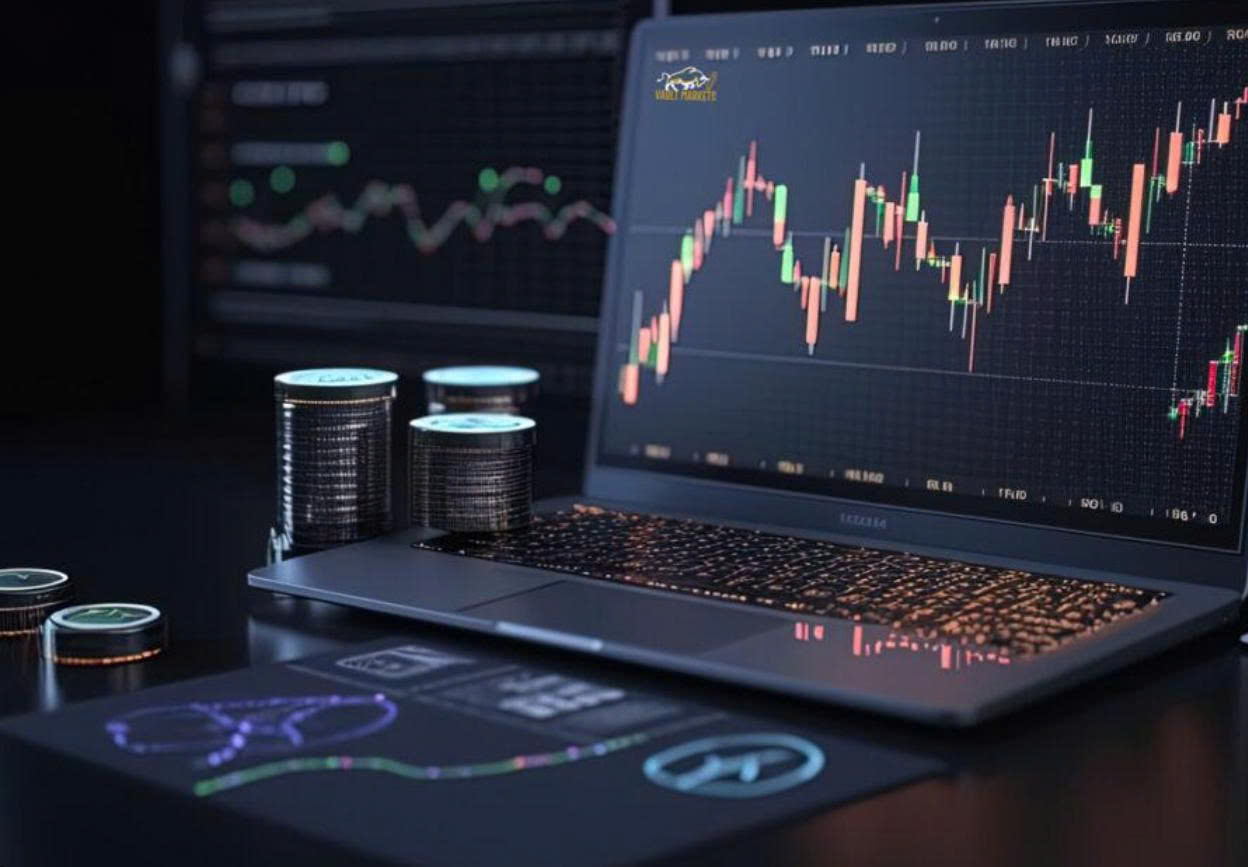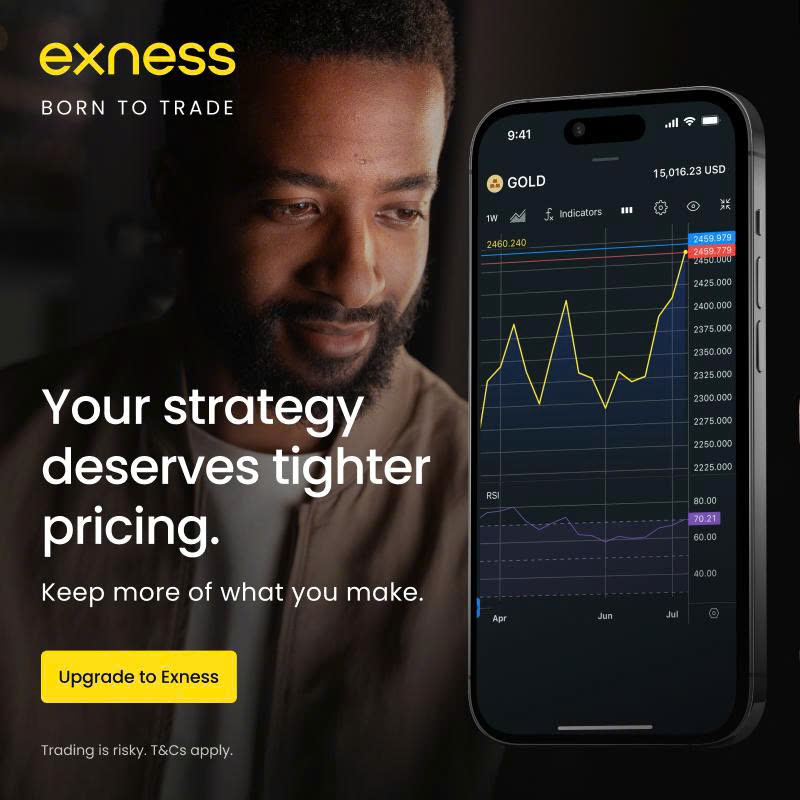
9 minute read
How Does Forex Trading Work in Nigeria? A Comprehensive Guide
from Exness
by Exness Blog
Forex trading, or foreign exchange trading, has become increasingly popular in Nigeria as a viable way to generate income online. With the rise of internet access, mobile trading apps, and a growing interest in financial markets, Nigerians are diving into the world of forex trading. But how exactly does forex trading work in Nigeria, and what do beginners need to know to succeed? This comprehensive guide will walk you through the basics, regulations, strategies, and practical steps to start forex trading in Nigeria.
Top 4 Best Forex Brokers in Nigeria
1️⃣ Exness: Open An Account or Visit Brokers 🏆
2️⃣ XM: Open An Account or Visit Brokers 💥
3️⃣ JustMarkets: Open An Account or Visit Brokers ✅
4️⃣ Quotex: Open An Account or Visit Brokers 🌐
What is Forex Trading?
Forex trading involves buying and selling currencies on the global foreign exchange market. It’s the largest and most liquid financial market in the world, with a daily trading volume exceeding $7 trillion. In Nigeria, forex trading allows individuals to speculate on the price movements of currency pairs, such as USD/NGN (US Dollar/Nigerian Naira) or EUR/USD (Euro/US Dollar), to make a profit.
The forex market operates 24 hours a day, five days a week, making it accessible for Nigerians to trade at any time. Unlike stock markets, forex trading is decentralized, meaning trades happen over-the-counter (OTC) through brokers or electronic platforms.
Why is Forex Trading Popular in Nigeria?
Forex trading has gained traction in Nigeria for several reasons:
· Accessibility: With just a smartphone or computer and an internet connection, anyone can start trading.
· Low Entry Barrier: Many brokers allow traders to start with as little as $10 or ₦5,000.
· High Profit Potential: Leverage allows traders to control large positions with small capital, amplifying potential gains (and risks).
· Economic Factors: Nigeria’s volatile economy and fluctuating naira value make forex trading appealing for hedging and speculation.
How Does Forex Trading Work in Nigeria?
To understand how forex trading works in Nigeria, let’s break it down into key components.
1. Understanding Currency Pairs
Forex trading involves trading currency pairs, which are quoted in pairs like USD/NGN or GBP/JPY. The first currency is the base currency, and the second is the quote currency. For example:
· In USD/NGN, if the exchange rate is 1500, it means 1 USD equals 1,500 NGN.
· Traders predict whether the base currency will strengthen or weaken against the quote currency.
There are three types of currency pairs:
· Major Pairs: Highly traded pairs like EUR/USD or USD/JPY.
· Minor Pairs: Pairs without the USD, like EUR/GBP.
· Exotic Pairs: Involve currencies from emerging markets, like USD/NGN.
2. The Role of Forex Brokers in Nigeria
To trade forex in Nigeria, you need a broker—a platform or company that connects you to the global forex market. Brokers provide trading platforms like MetaTrader 4 (MT4) or MetaTrader 5 (MT5), which are popular in Nigeria.
When choosing a broker, Nigerians should consider:
· Regulation: Ensure the broker is regulated by reputable authorities like the FCA (UK), ASIC (Australia), or CySEC (Cyprus). In Nigeria, the Securities and Exchange Commission (SEC) oversees financial markets, but forex regulation is limited.
· Low Spreads: Look for brokers with competitive spreads to reduce trading costs.
· Deposit and Withdrawal Options: Brokers should support local payment methods like bank cards, mobile money, or cryptocurrency.
· Demo Accounts: Practice trading with virtual funds before risking real money.
Popular brokers in Nigeria include XM, HotForex, OctaFX, and FXTM, known for their user-friendly platforms and support for Nigerian traders.
3. Leverage and Margin
Leverage allows traders to control larger positions with a small amount of capital. For example, with 100:1 leverage, a $100 deposit can control a $10,000 position. While leverage can amplify profits, it also increases the risk of significant losses.
Margin is the amount of money required to open a leveraged position. Brokers set margin requirements, and if your account balance falls below the margin level, you may face a margin call, requiring you to deposit more funds or close positions.
4. How Trades Are Executed
Forex trading in Nigeria involves the following steps:
· Choose a Currency Pair: Decide which pair to trade, such as USD/NGN or EUR/USD.
· Analyze the Market: Use technical analysis (charts, indicators) or fundamental analysis (economic news, interest rates) to predict price movements.
· Place a Trade: Decide whether to buy (go long) if you expect the base currency to rise or sell (go short) if you expect it to fall.
· Set Stop-Loss and Take-Profit: Use these tools to manage risk and lock in profits.
· Monitor and Close: Track your trade and close it manually or automatically when your target is reached.
5. Pips and Lot Sizes
A pip is the smallest price movement in a currency pair, typically the fourth decimal place (e.g., a change from 1.2000 to 1.2001 is one pip). In Nigeria, understanding pips is crucial for calculating profits or losses.
Traders use lot sizes to determine trade volume:
· Standard Lot: 100,000 units of the base currency.
· Mini Lot: 10,000 units.
· Micro Lot: 1,000 units (ideal for beginners with small accounts).
For example, a 1-pip movement in a micro lot of EUR/USD might equal $0.10, depending on the broker.

💥 Trade with Exness now: Open An Account or Visit Brokers 🏆
Is Forex Trading Legal in Nigeria?
Forex trading is legal in Nigeria, but it operates in a relatively unregulated environment. The Central Bank of Nigeria (CBN) and the SEC oversee financial activities, but there’s no specific framework for retail forex trading. This means Nigerians must be cautious when choosing brokers and avoid scams.
To stay safe:
· Work with regulated brokers.
· Avoid “get-rich-quick” schemes promising guaranteed profits.
· Verify the broker’s reputation through reviews and user feedback on platforms like X or forex forums.
Getting Started with Forex Trading in Nigeria
Here’s a step-by-step guide to start forex trading in Nigeria:
Step 1: Educate Yourself
Before trading, learn the basics of forex trading through:
· Online Courses: Platforms like Babypips offer free forex education.
· YouTube Channels: Search for reputable forex educators focusing on Nigeria.
· Books: “Currency Trading for Dummies” is a great starting point.
Step 2: Choose a Reliable Broker
Select a broker that supports Nigerian traders. Compare:
· Minimum deposit requirements.
· Trading platforms (MT4, MT5, or proprietary apps).
· Customer support and local payment options.
Step 3: Open a Trading Account
Most brokers offer:
· Demo Accounts: Practice trading with virtual funds.
· Live Accounts: Start with a small deposit, like ₦5,000 or $10.
· Islamic Accounts: Swap-free accounts for Muslim traders adhering to Sharia law.
Step 4: Fund Your Account
Nigerian traders can fund accounts using:
· Local bank cards (Visa, Mastercard).
· Mobile money platforms like Flutterwave or Paystack.
· Cryptocurrency (Bitcoin, USDT) for brokers that support it.
Step 5: Develop a Trading Plan
A trading plan includes:
· Goals: Define your profit targets and risk tolerance.
· Strategy: Choose between day trading, swing trading, or scalping.
· Risk Management: Never risk more than 1-2% of your account per trade.
Step 6: Start Trading
Begin with a demo account to practice, then transition to a live account with small trades. Monitor economic news, such as CBN policies or US Federal Reserve announcements, as they impact currency prices.
Forex Trading Strategies for Nigerians
To succeed in forex trading, Nigerians can use these popular strategies:
1. Technical Analysis
Use charts, indicators (e.g., Moving Averages, RSI), and patterns to predict price movements. For example, trading the USD/NGN pair requires analyzing historical trends due to naira volatility.
2. Fundamental Analysis
Monitor economic indicators like:
· Nigeria’s inflation rate and CBN interest rate decisions.
· US non-farm payrolls or GDP data for USD-based pairs.
· Oil prices, as Nigeria’s economy is oil-dependent.
3. Scalping
Scalping involves making quick trades to capture small price movements. It’s suitable for Nigerians with limited trading time but requires fast execution and low spreads.
4. Swing Trading
Hold trades for days or weeks to capture larger price swings. This strategy suits traders who can’t monitor the market constantly.

💥 Trade with Exness now: Open An Account or Visit Brokers 🏆
Challenges of Forex Trading in Nigeria
While forex trading offers opportunities, Nigerians face unique challenges:
· Internet Connectivity: Unstable internet can disrupt trading. Use reliable providers or mobile hotspots.
· Currency Volatility: The naira’s fluctuations can affect profits, especially for USD/NGN traders.
· Scams: Beware of unregulated brokers or Ponzi schemes disguised as forex training programs.
· Funding Issues: Some brokers don’t support local payment methods, complicating deposits and withdrawals.
To overcome these, research thoroughly, start small, and prioritize risk management.
Tips for Successful Forex Trading in Nigeria
· Start Small: Begin with a micro account to minimize losses while learning.
· Use Risk Management: Always set stop-loss orders to protect your capital.
· Stay Informed: Follow economic news on platforms like X or Bloomberg to anticipate market moves.
· Avoid Overtrading: Stick to your trading plan and avoid emotional decisions.
· Join Communities: Engage with Nigerian forex traders on X or local forums to share tips and avoid scams.
The Role of Technology in Forex Trading
Technology has transformed forex trading in Nigeria:
· Mobile Apps: Brokers like XM and OctaFX offer apps for trading on the go.
· Automated Trading: Expert Advisors (EAs) on MT4/MT5 allow automated trading based on pre-set strategies.
· Social Trading: Platforms like eToro let beginners copy trades from experienced traders.
However, ensure your device is secure to avoid hacking or phishing scams.
Common Mistakes to Avoid
Beginners in Nigeria often make these mistakes:
· Overleveraging: Using high leverage without understanding risks can wipe out accounts.
· Ignoring Risk Management: Not using stop-loss orders increases potential losses.
· Chasing Losses: Emotional trading after a loss can lead to bigger losses.
· Falling for Scams: Avoid brokers or mentors promising unrealistic returns.
The Future of Forex Trading in Nigeria
The forex trading industry in Nigeria is poised for growth due to:
· Increasing internet penetration and smartphone usage.
· Growing interest in financial literacy among young Nigerians.
· Potential regulatory developments by the CBN or SEC to protect traders.
However, education and caution will remain key to navigating this dynamic market.
Conclusion
Forex trading in Nigeria offers exciting opportunities for those willing to learn and approach it with discipline. By understanding currency pairs, choosing a reliable broker, and developing a solid trading plan, Nigerians can tap into the global forex market. While challenges like internet issues and scams exist, proper education and risk management can pave the way for success.
Read more:










